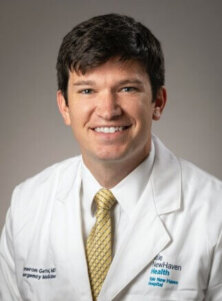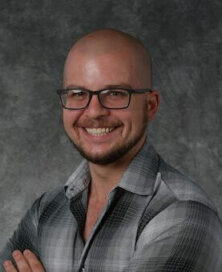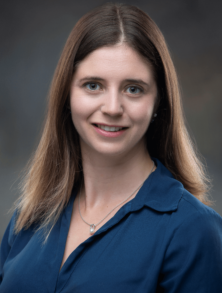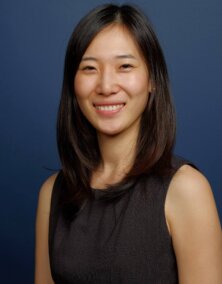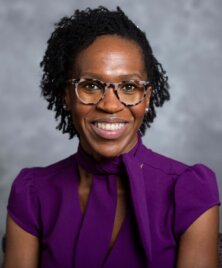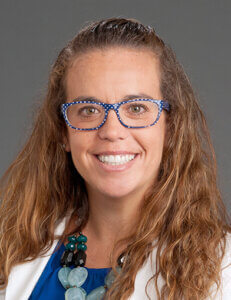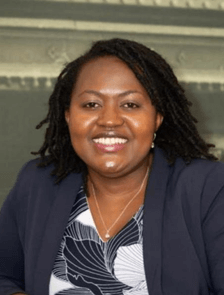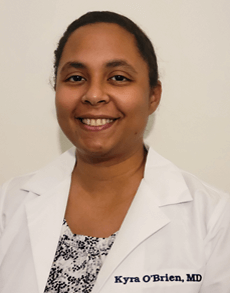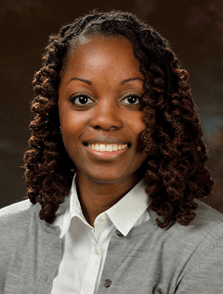Faculty Scholars Program
The IMPACT Faculty Scholars Program aims to enhance the career development of investigators in the design and conduct of embedded pragmatic clinical trials for people living with dementia and their care partners by integrating them into the activities of our Cores and Teams. Faculty Scholars attend monthly Core meetings, are mentored by an IMPACT executive committee member, engage in scholarly projects to enrich career development, and attend Collaboratory-wide events including Training Workshops and the Annual Business Meeting and Scientific Conference. Throughout the year, faculty participate in monthly Grand Rounds and quarterly Research-in-Progress seminars in addition to other opportunities for career development, training and networking. Faculty Scholars are nominated by IMPACT members. This is a one-year program though a second year may be possible contingent on availability.

Alyssa Aguirre, MSW, LCSW
Assistant Director of Dementia Care Transformation
The University of Texas at Austin
Alyssa Aguirre serves as the assistant director of dementia care transformation for The University of Texas Dell Medical School Department of Neurology and is an assistant professor of practice at the UT Steve Hicks School of Social Work. She has dedicated her social work career to designing innovative models of support for family caregivers of individuals living with Alzheimer’s disease and related disorders (ADRD) within health care systems. Her current research is focused on validating family caregiver outcome measures and using machine-learning techniques to support dementia care partners. Alyssa Aguirre's mission is to improve the quality of life of older adults living with dementia and their family caregivers through clinical practice, education, research, and community collaboration. Her vision is to serve as a leader and change-agent for palliative care initiatives that will help to transform caregiving programs on a national level.

Roman Ayele, PhD, MPH
Health Research Scientist
Veterans Affairs (VA) Denver-Seattle Center of Innovation
Dr. Ayele is a health research scientist at the VA Denver-Seattle Center of Innovation for Veteran centered research and an assistant professor in the Division of Geriatrics at the Colorado School of Medicine. Dr. Ayele earned her doctorate in health services research from University of Colorado School of Public Health and completed her fellowship at the Center for Delivering Care Delivery for the Aging at the University of Pennsylvania. Her research interests include context informed, partner engaged, equitable implementation of evidence-based interventions for people living with dementia. Dr. Ayele’s VA Health Services Research and Development Career Development Award (CDA) focuses on optimizing transitional care for Veterans living with dementia who are dual-users of VA and non-VA healthcare systems. Dr. Ayele’s CDA award will create and pilot a care coordination intervention informed by mixed-methods assessment of contextual factors that impact Veterans with dementia, their family care givers, and clinicians in transitions of care.

Zachary Baker, PhD
Assistant Professor
Arizona State University Edson School of Nursing and Health Innovation
Dr. Baker is an assistant professor at Arizona State University’s Edson School of Nursing and Health Innovation. Dr. Baker’s aim is to better understand, develop, evaluate, and disseminate technological tools and psychosocial resources that help caregivers and people living with dementia to thrive during and after the dementia caregiving process. This is accomplished through the use of advanced methods (e.g., interventions, longitudinal studies, event momentary assessment, dyadic data collection), statistics (e.g., multilevel modeling, structural equation modeling, response surface analysis), and psychological theory/perspectives (e.g., self-determination theory, attachment theory, positive psychology). Dr. Baker convenes the Supporting Dementia Caregivers After Death Community Advisory Board.

Kuan-Hua Chen, PhD
Assistant Professor
University of Nebraska Medical Center
Dr. Chen is an assistant professor in neurological sciences, College of Medicine, at the University of Nebraska Medical Center. Dr. Chen’s research focuses on advancing the characterization, assessment, and interventions for socio-emotional changes in individuals living with dementia and the impact of these changes on family care partners. As the principal investigator of a NIA-funded study, Dr. Chen develops innovative brain, physiological, behavioral, and technology-based (e.g., wearables, smart-home devices) measures to monitor and predict social disconnectedness between individuals living with dementia and their spousal care partners and their downstream health outcomes. Dr. Chen seeks to enhance relevant skills to conduct technology-centered and community-based pragmatic clinical trials that aim to optimize social connectedness and mitigate health declines in rural and urban aging Americans in their homes and other healthcare settings.

Natalie Douglas, PhD
Professor
The Herbert H. and Grace A. Dow College of Health Professionals, Central Michigan University
Dr. Douglas is a professor of communication sciences and disorders, Division of Speech-Language Pathology, at Central Michigan University. As a clinician-scholar, she is firmly committed to closing the research to practice gap, particularly for people living with acquired communication disorders from neurological disease. Dr. Douglas actively partners with speech-language pathologists to develop and test interventions that improve communication, life participation, and quality of life for people living with aphasia, traumatic brain injury, and dementia. She is currently studying how to improve communication between people living with dementia and their staff care partners in long-term care environments and pursuing additional training in pragmatic clinical trials and learning health systems.

Natalie Ernecoff, PhD, MPH
Associate Policy Researcher
RAND Corporation
Dr. Ernecoff is an associate policy researcher at the RAND Corporation. Her research focuses on developing, implementing, and evaluating systems-level palliative care, hospice, and home care interventions. Her work includes healthcare system informatics, electronic health record (EHR)-based interventions, systematic identification of serious illness populations, and collaborative models of palliative care delivery. She is experienced in qualitative and mixed methods research, implementation science, population health management, program evaluation, and clinical research. Dr. Ernecoff is leading work to explore the feasibility of developing a measure of goal-concordant care based upon both coded and free text data in nursing home EHRs.

Beth Fields, PhD
Assistant Professor
University of Wisconsin–Madison
Dr. Fields is an occupational therapist, assistant professor in the Department of Kinesiology, and affiliate faculty member in the Center for Aging Research and Education (CARE), Wisconsin Alzheimer's Disease Research Center (ADRC), Institute on Aging, and Center for Demography of Health and Aging at the University of Wisconsin–Madison. Her research focuses on developing, testing and implementing person and family-centered assessments and interventions in the hospital and home settings. Dr. Fields is hugely passionate about finding ways to improve the quality of care and life of aging adults and their family member or friend care partners.
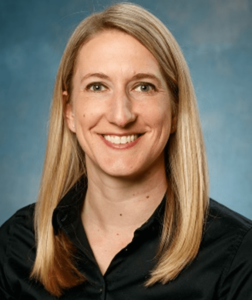
Lisa Juckett, PhD, OTR/L, CHT
Assistant Professor
The Ohio State University School of Health & Rehabilitation Sciences
Dr. Juckett is an assistant professor in the School of Health and Rehabilitation Sciences at The Ohio State University. She is an occupational therapist with extensive clinical experience in inpatient and geriatric rehabilitation settings. Her current research centers on developing effective and implementable programs that improve the ability for older adults to age in their own homes and communities. Dr. Juckett is a 2022 IMPACT Collaboratory Career Development Award recipient and is growing her skills in intervention development, PCRO selection, and pragmatic trial design. She is completing her CDA activities in close collaboration with her local home-delivered meal agency to develop an intervention that supports the health and nutritional needs of both PLWD and their care partners in the home environment.

Maria Mora Pinzon, MD, MS, FACPM
Assistant Professor
University of Wisconsin–Madison School of Medicine and Public Health
Dr. Mora Pinzon is board certified in preventive medicine and public health. She is currently an assistant professor on the tenure track at the University of Wisconsin–Madison, Department of Medicine, Division of Geriatrics and Gerontology. Dr. Mora Pinzon is a REC scholar with the Wisconsin Alzheimer’s Disease Research Center and is the principal investigator of an NIA K99/R00 project titled “Improving Access to Alzheimer’s Disease and Related Dementia’s Care Services for Latinx Individuals at Community Health Clinics”. Her work seeks to improve healthcare access for patients living with dementia and their families, particularly among Latino populations. Using community-based participatory research and implementation science, Dr. Mora Pinzon explores behavioral motivations to seek care, utilization of health services in brain health, and organizational factors that affect diagnosis and management. Furthermore, her work involves stakeholders in the identification of targets for future interventions and development.

Annalisa Na, PhD, PT, DPT
Assistant Research Professor
Drexel University College of Nursing and Health Professions
Dr. Na is an assistant research professor in the Department of Physical Therapy and Rehabilitation Sciences at Drexel University. She is funded by the National Institute of Aging on a Mentored Patient Oriented Research Career Development Award (K23AG081547). As a clinician scientist, Dr. Na focuses on sustaining and improving mobility through tailored physical activity and exercise that can enhance the quality of life in older adults. She received her doctorate in physical therapy from Duke University, PhD in biomechanics and movement sciences from the University of Delaware, and post-doctoral training from the University of Texas Medical Branch. She is residency trained and is board certified in orthopedic physical therapy. Dr. Na’s current research is focused on designing tailored physical activity and exercise programs for pain management among community-dwelling older adults with dementia.
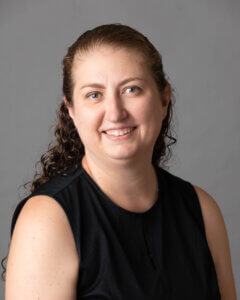
Darina Petrovksy, PhD, RN
Assistant Professor
Rutgers School of Nursing; Rutgers Institute for Health, Health Care Policy, and Aging Research
Dr. Petrovsky is an assistant professor at the Rutgers University School of Nursing and core member of the Institute for Health, Health Care Policy, and Aging Research. Prior to joining Rutgers, Dr. Petrovsky was a postdoctoral research fellow at the University of Pennsylvania School of Nursing funded by the Ruth L. Kirschstein National Research Service Award Individual Fellowship (F32AG060630). Her unique background in music and nursing science has positioned her well to launch her research career with the goal of improving the lives of older adults living with cognitive impairment using non-pharmacologic approaches. She currently holds a Mentored Patient-Oriented Research Career Development Award from the NIA (K23AG073618) aimed at developing a music-based intervention for older adults living with dementia.

Kendra Ray, MPH, PhD
Research Assistant Professor
New York University Grossman School of Medicine
Dr. Ray is a research assistant professor in the Department of Rehabilitation Medicine at NYU Grossman School of Medicine and dementia program director at Menorah Center for Rehabilitation and Nursing Care. Dr. Ray is a music therapist whose research focuses on discovering the effectiveness of evidence-based interventions for people with dementia and their paid and informal caregivers. Other research interests include risk factors and biomarkers in Alzheimer’s disease as well as the use of music therapy for chronic health conditions like HIV-associated neurocognitive disorder and depression.
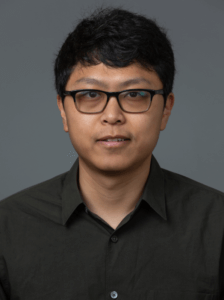
Guangyu Tong, PhD
Assistant Professor of Cardiovascular Medicine and Biostatistics
Yale School of Medicine
Dr. Tong is an assistant professor of cardiovascular medicine and biostatistics at the Yale School of Medicine. Dr. Tong’s methodological research interests include the design and analysis of pragmatic trials, implementation science, causal inference, and Bayesian statistics. Many of his research projects are motivated by understanding health disparity and social determinants of health. His current research focuses on the evaluation of non-mortality outcomes that are censored or truncated by death, a problem particularly common in studies among older adults.
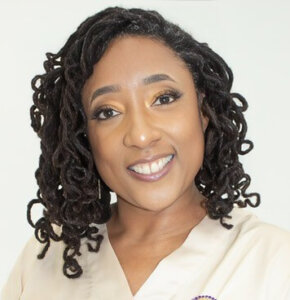
Tiffany Washington, PhD
Associate Professor
The University of Georgia School of Social Work
Dr. Washington is an associate professor at the University of Georgia. Her medical social work practice background informs her research interests in family caregiving, psychosocial interventions, and health equity. Dr. Washington designed a caregiver respite program in which student volunteers deliver in-home respite visits to caregivers of persons with dementia. Recently, she was awarded a grant from the Alzheimer’s Association to pilot test a virtual version of the program. She seeks to understand how embedded pragmatic clinical trials promote the uptake of caregiver interventions in everyday practice settings.
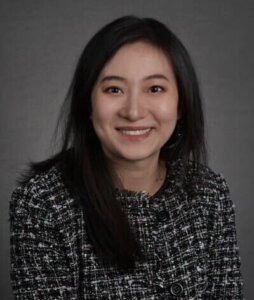
Emma Zang, PhD
Assistant Professor of Sociology, Biostatistics, and Global Affairs
Yale University
Dr. Zang is an assistant professor of sociology, biostatistics, and global affairs at Yale University. Her research focuses on the intersection of health and aging, family demography, and inequality. Through her expertise in statistical analysis, she strives to comprehend the co-evolution of health trajectories among individuals with cognitive impairment and their caregivers over time. One of Dr. Zang's key contributions is the development of statistical methods to model trajectories and life transitions, enabling a deeper understanding of how demographic and socioeconomic disparities influence the health and well-being of individuals from a life course perspective. Her work delves into Bayesian approaches for modeling group-based trajectories, incorporating Bayesian Model Averaging techniques, and employing Bayesian methods to construct multi-state life tables using extensive survey data. In addition, Dr. Zang employs observational data to explore causal inference, allowing for insights into the impact of various factors on health outcomes.







